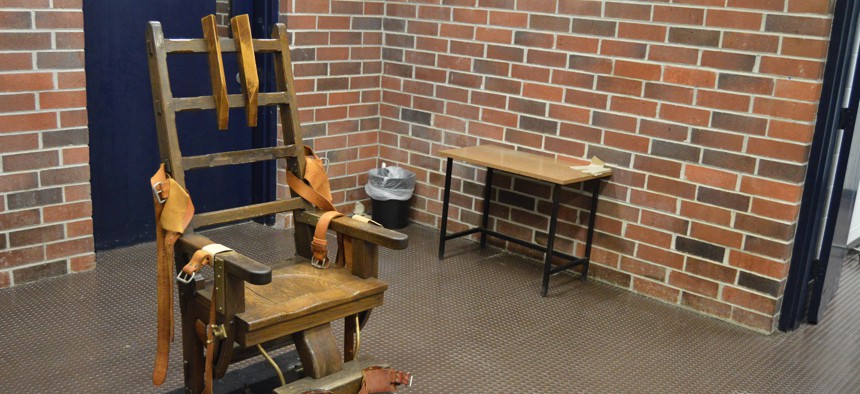South Carolina Brings Back the Firing Squad for Executions

This March 2019 photo provided by the South Carolina Department of Corrections shows the state's electric chair, in Columbia, S.C. Kinard Lisbon/South Carolina Department of Corrections via AP
Amid a lethal injection drug shortage, the state has put no inmates to death in a decade. Those on death row must now choose between the electric chair and firing squad if drugs are unavailable.
South Carolina will bring back the firing squad as a way to resume executions that were on indefinite hold due to a shortage of lethal injection drugs.
Gov. Henry McMaster signed a bill Friday that will force death row inmates to choose between the firing squad or the electric chair when lethal injection is not possible.
Under previous state law, inmates on death row were sentenced to die by lethal injection unless they choose to be put to death by electric chair.
The number of executions carried out in the United States has dropped over the last decade as states have abolished the practice. For states like South Carolina, which still have the death penalty on the books, it’s become more difficult to procure lethal injection drugs.
South Carolina last carried out an execution 10 years ago, according to the Death Penalty Information Center. The state put 18 people to death the decade prior, between 2001 and 2011.
Thirty-seven inmates are on death row in the state and McMaster said the law would ensure those death sentences could be carried out.
“The families and loved ones of victims are owed closure and justice by law,” McMaster wrote Monday on Twitter. “Now, we can provide it.”
South Carolina becomes the fourth state to allow executions by firing squad, joining Oklahoma, Mississippi and Utah, according to CNN.
The Democratic lawmaker who sponsored the bill told the Post and Courier he did so in order to provide a more humane way to carry out death sentences.
“There’s instance after instance after instance where people are not dead after the first jolt, they’re screaming and on fire,” said state Sen. Dick Harpootlian, a former prosecutor. “Horrible, horrible thing to do to another human being.”
A firing squad is less likely to lead to a painful death, he said.
“The death penalty is going to stay the law here for a while,” Harpootlian said. “If we’re going to have it, it ought to be humane.”
But opponents of the death penalty said the state’s decision will restart a flawed system.
More than half of the inmates on South Carolina’s death row are Black, despite making up only 27% of the state’s population, according to the American Civil Liberties Union of South Carolina.
Capital punishment is carried out “arbitrarily” in the state, said Frank Knaack, the executive director of the ACLU of South Carolina.
“This bill is about finding a new way to restart executions within a racist, arbitrary, and error-prone system,” Knaack said in a statement. “The likelihood of receiving a death sentence in South Carolina is not primarily based on the facts in your case, but rather on the race and gender of the victim, the location of the offense, and the Solicitor in office at the time of the offense.”
Andrea Noble is a staff correspondent with Route Fifty.
NEXT STORY: Texas Moves to Ban Police From Participating in Reality Shows





